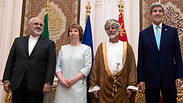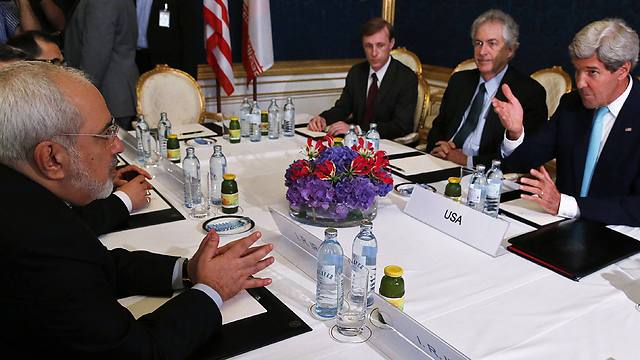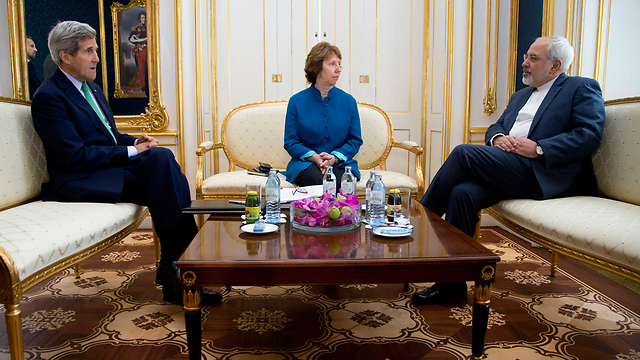
Iran nuclear talks stuck deadline may be extended till March
After a last-minute push to secure a deal in meeting with foreign ministers, Kerry heading to Vienna to 'check in' on high-level nuclear negotiations with Tehran, as talks reach final stretch.
A deadline for resolving a 12-year-old dispute over Iran's nuclear program may be extended from Monday until March, because of sharp disagreements between Tehran and Western powers, officials close to the talks said on Thursday.
Meanwhile, Strategic Affairs Minister Yuval Steinitz commented on the talks and said "Israel is concerned with two central issues which have not received enough attention. First, is the Iranian attempt to safeguard as part of an agreement their right to develop advanced centrifuges as part of a research and development program. The second, Israel fears Iranian cooperation with North Korea, which will allow Iran to circumnavigate sanctions and restrictions."
The negotiations, under way in Vienna, are deadlocked, officials say, and will probably have to be extended due to a number of sticking points, such as limits on Iran's uranium enrichment and the speed at which sanctions on Tehran would be lifted.
The UN nuclear chief Yukiya Amano on Thursday highlighted another hurdle: Iran has yet to explain suspected atomic bomb research to the UN nuclear agency, one of the conditions of the six powers for lifting sanctions.
Related stories:
- Iran nuclear deal seems unlikely by deadline, Iranian and Western officials say
- Iran offers 'compromises' in nuclear talks; West unmoved
- Obama says still 'big gap' in Iran nuclear talks
The latest round of talks between the six began on Tuesday and are likely to last right up to the self-imposed Nov 24 deadline for a final agreement.
"Some kind of interim agreement at this point is likely, or perhaps at best a framework agreement by Monday that needs to be worked out in the coming weeks and months," a Western diplomat said on condition of anonymity.

US Deputy National Security Adviser Tony Blinken said this week a comprehensive deal would be difficult, but not impossible to achieve by Monday. British Foreign Secretary Philip Hammond said he was not optimistic but that there may be a way of extending the deadline.
A senior Iranian official had similar expectations.
"We need more time to resolve technical issues and don't forget that the time frame for lifting sanctions is still a huge dispute," the Iranian official said, adding that an extension until March was a possibility. Western officials also suggested March was an option, with a resumption of talks in January.
The officials said, however, that Iran and the six were not actively discussing an extension yet and would push for a deal by the deadline, which has already been extended from July.
Officials close to the negotiations, which began in February, say that Iran wants all key sanctions on oil exports and banking terminated almost immediately, not merely suspended as the United States and European officials have said.
Tehran denies allegations from Western powers and their allies that it is amassing the capability to produce nuclear weapons under cover of a civilian energy program. It has refused to halt uranium enrichment, leading to crippling international sanctions for the past eight years.
Western powers say the sanctions can be suspended gradually and in line with moves by Iran to restrain its nuclear activities and terminated only after Tehran has demonstrated full compliance with the terms of any deal.
There is also a dispute over the duration of any deal, with Western powers wanting Iranian restrictions to last for 20 years and Iranians pushing for either months or a small number of years, diplomats say.
There is also a blame game developing about who is responsible for the deadlock in the nuclear talks.
Western officials say Iran also refused to budge on enrichment, despite repeated offers of potential compromises by the six powers, including the United States.
Tehran is willing to consider keeping fewer enrichment centrifuges as long as they are advanced, to keep the volume unchanged, Western officials say, adding that this represents no compromise at all.
Western officials say the West is willing to compromise but Iran is not largely because Supreme Leader Ayatollah Ali Khamenei has not given the negotiators the freedom to make real compromises in the talks.
"The ball is in the Iranian camp and to be honest we have a feeling that we're treading water at the moment," a senior Western diplomat said. "The main obstacle is that the decisions have to be made by the Iranian leadership."
The Iranians, however, pin the blame on Western powers, which they accuse of expecting too much from Tehran.
Iranian Foreign Minister Mohammad Javad Zarif said on Tuesday that Iran would resist Western pressure to make what it considered to be excessive concessions in the Vienna talks.
Ban urges both sides to compromise
UN Secretary-General Ban Ki-moon on Thursday urged all parties in nuclear talks between Iran and six world powers to show flexibility in order to finally resolve a 12-year dispute over Tehran's atomic program.
"The Secretary-General calls on all participants to demonstrate the necessary flexibility, wisdom and determination to bring the negotiations to a successful conclusion that meets the concerns and interests of all sides," Ban's press office said in a statement.
"He is convinced that such an accord can contribute to the strengthening of regional and international peace and security at a time when global cooperation is needed perhaps more than ever," the statement said, adding that Ban hoped a deal would "restore confidence in the peaceful nature of Iran's nuclear program."
French Foreign Minister Laurent Fabius and his US counterpart, Secretary of State John Kerry, acknowledged on Thursday there was some way to go in the negotiations between Iran, the United States, Britain, France, Germany, Russia and China to iron out differences with Iran.
"We want a deal, but important points of difference remain," Fabius said in a joint statement with Kerry in Paris.
"We hope that we can reduce those in the coming days, but that will depend on the attitude of the Iranians."
Fabius, whose country is deemed to have a tough stance in the talks, is due to head to Vienna before the weekend.
Kerry said he shared Fabius' view and noted the P5+1 representatives that are meeting Iranian officials this week in Vienna had a united approach even if there could be "minor differences" between all them.
"On the fundamental principles ... we are in agreement that you have to be able to verify this, there has to be limits, an acceptable level and we are confident of our unity," he told a separate news conference at the US embassy in Paris.
Asked whether the most likely conclusion on Nov. 24 was an extension in talks - something diplomats have said privately is probable - Kerry said that was not being talked about.
"We are not discussing an extension, we are negotiating to try and get an agreement," he said. "If you get to the final hour and you need to look at alternatives then we'll look at them," he said, ahead of travelling to Vienna later on Thursday.
In Vienna, Kerry is going to "check in" on the high-level nuclear negotiations with Iran, said State Department spokeswoman Jen Psaki. It is not yet determined how long he will stay in Vienna, leaving open the possibility that he might not remain until Monday's deadline for a deal. Kerry is to meet with the US negotiating team in Vienna late Thursday before scheduling meetings with other participants.
"We do want to get an agreement, but not just any agreement," Kerry said Thursday after meeting in Paris with the Saudi and French foreign ministers. "We hope that the gaps that exist - and they do exist - can be closed. We hope we can define the finish line."
Kerry had been expected to join the Vienna negotiations, but the timing of his arrival at the talks had been uncertain until shortly after he arrived in Paris after two days of similar meetings in London with his British and Omani counterparts.
With Monday's deadline for a deal looming, Kerry has embarked on a frenzy of high-stakes diplomacy in a last-minute push to secure an agreement - or at least prevent the process from collapsing after talks were already extended once.
Despite Kerry's efforts, though, signs increasingly pointed to the Nov. 24 deadline passing without a deal and the negotiations being extended a second time.
In London on Tuesday and Wednesday, Kerry met with Foreign Minister Yusuf bin Alawi of Oman, a key bridge between Washington and Tehran, a senior US official said.
Kerry's meetings with Fabius and Saudi Foreign Minister Saud al-Faisal are considered critical because French objections last year delayed the adoption of an interim agreement by several weeks, and Saudi Arabia remains deeply concerned about the potential for its archrival Iran to win concessions from the West.
The Obama administration is trying to satisfy the concerns of lawmakers, Republican and Democratic, at home.
Republican senators sent a letter to the White House on Wednesday urging the administration against trying to circumvent Congress in any deal with Iran. "Unless the White House genuinely engages with Congress, we see no way that any agreement consisting of your administration's current proposals to Iran will endure," said the letter, which was signed by all 45 Senate Republicans.
The Associated Press contributed to this report.











